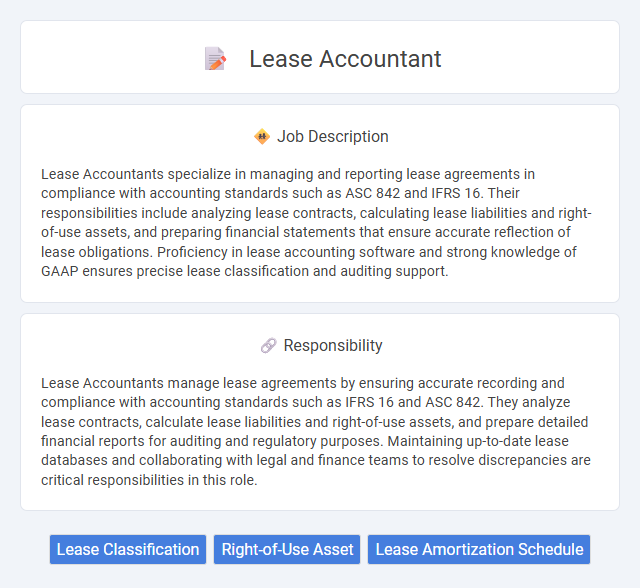
Lease Accountants specialize in managing and reporting lease agreements in compliance with accounting standards such as ASC 842 and IFRS 16. Their responsibilities include analyzing lease contracts, calculating lease liabilities and right-of-use assets, and preparing financial statements that ensure accurate reflection of lease obligations. Proficiency in lease accounting software and strong knowledge of GAAP ensures precise lease classification and auditing support.
Individuals with strong analytical skills and attention to detail are likely well-suited for a Lease Accountant role, as the job requires accurate management of lease contracts and financial records. Those who are comfortable working with complex accounting standards and enjoy structured financial tasks may find this position fitting. However, candidates who prefer creative or highly social work environments might not find this role as compatible.
Qualification
Lease Accountants require a strong background in accounting principles, typically holding a bachelor's degree in accounting, finance, or a related field. Proficiency in lease accounting standards such as ASC 842, IFRS 16, and GASB 87 is essential for accurate financial reporting and compliance. Expertise in lease management software, strong analytical skills, and attention to detail enhance the ability to manage lease portfolios and maintain precise records.
Responsibility
Lease Accountants manage lease agreements by ensuring accurate recording and compliance with accounting standards such as IFRS 16 and ASC 842. They analyze lease contracts, calculate lease liabilities and right-of-use assets, and prepare detailed financial reports for auditing and regulatory purposes. Maintaining up-to-date lease databases and collaborating with legal and finance teams to resolve discrepancies are critical responsibilities in this role.
Benefit
Lease accountant roles likely offer benefits such as increased expertise in financial reporting and compliance with lease accounting standards like ASC 842 or IFRS 16. Professionals in this position probably gain valuable experience with lease management software and enhanced analytical skills, improving their career prospects. The role may also provide stability and growth opportunities within corporate finance or real estate sectors.
Challenge
The role of a lease accountant likely involves navigating complex lease accounting standards, such as ASC 842 or IFRS 16, which can present significant challenges in accurately interpreting and applying guidelines. Managing large volumes of lease data while ensuring compliance and seamless integration with financial reporting systems may require strong analytical skills and meticulous attention to detail. The position probably demands ongoing adaptation to regulatory changes and collaboration across departments to resolve discrepancies and optimize lease management processes.
Career Advancement
Lease Accountants gain expertise in managing complex lease portfolios and compliance with ASC 842 and IFRS 16 standards, which enhances their value in corporate finance teams. Proficiency in lease accounting software such as CoStar, LeaseQuery, or SAP enables transition into senior financial analyst or corporate controller roles. Continuous professional development and certification, like CPA or CMA, significantly improve opportunities for advancement to finance management or CFO positions.
Key Terms
Lease Classification
Lease accountants specialize in lease classification, a critical process that determines whether a lease is classified as an operating lease or a finance lease under accounting standards such as IFRS 16 and ASC 842. Accurate lease classification impacts the recognition of lease liabilities and right-of-use assets on the balance sheet, influencing financial statements and compliance. Proficiency in analyzing lease terms, including lease duration, renewal options, and payment structures, is essential for ensuring proper lease classification and reporting.
Right-of-Use Asset
A Lease Accountant is responsible for accurately calculating and managing the Right-of-Use (ROU) Asset on the balance sheet, ensuring compliance with ASC 842 and IFRS 16 lease accounting standards. They analyze lease agreements to determine lease terms, discount rates, and amortization schedules, optimizing asset valuation and reporting. Accurate ROU Asset management impacts financial statements by reflecting lease liabilities and improving transparency in lease obligations.
Lease Amortization Schedule
A Lease Accountant specializes in managing lease amortization schedules to accurately allocate lease expenses over the contract term, ensuring compliance with ASC 842 and IFRS 16 standards. They analyze lease payments, calculate interest and principal portions, and update schedules to reflect changes in lease terms or modifications. Expertise in lease accounting software and strong financial reporting skills are essential for maintaining precise amortization records and supporting audit readiness.
 kuljobs.com
kuljobs.com